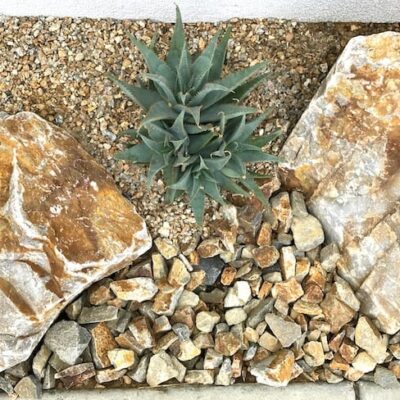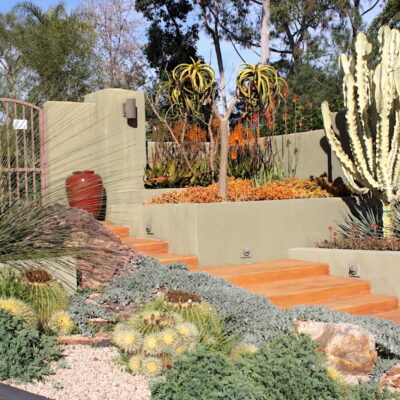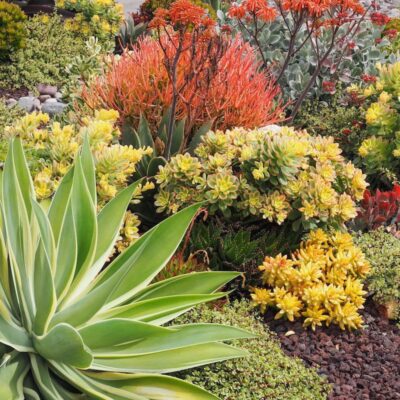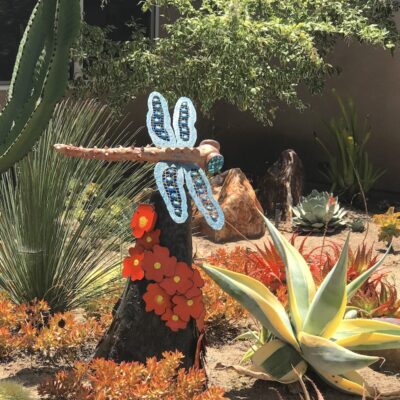To ensure your success and help you avoid mistakes, here are a dozen succulent garden design essentials to keep in mind. Many thanks to homeowner Nancy Dalton, whose award-winning succulent garden in San Diego is an example of smart landscaping for Southern California.
Repeat colors and forms
By combining agaves with yuccas, the designers used similar-but-different plants to create continuity. The Yucca rostrata at far right repeats the dark green starburst shapes of slender-leaved agaves at middle left. These in turn echo an intriguing aspect of each other: white filaments that curl from leaf margins.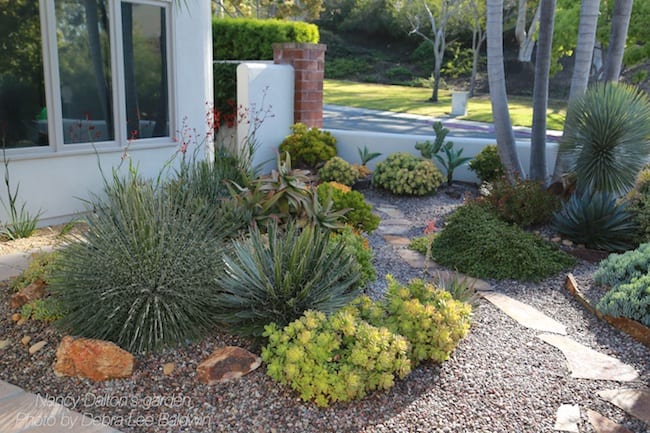
Incorporate textural plants
Texture is both what's seen up-close, like fuzzy red kangaroo paw flowers, and what's viewed from a distance, like the mounding jade at middle right and 'Sticks on Fire' beyond. Also highly textual are barrel cacti and any plant that shimmers in the breeze---like the Yucca rostrata at left.
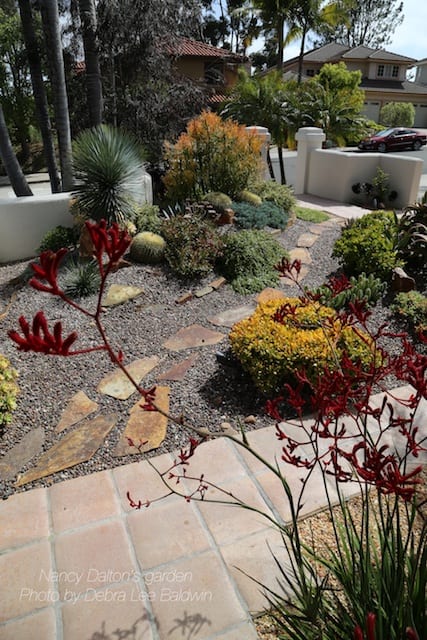
Sculpt the terrain ...
... with berms and valleys. Mounded soil is more interesting than flat and height enhances drainage. Tip: Bring in several yards of topsoil amended with pumice and mound it atop your former lawn or a difficult-to-dig area of compacted dirt. The succulents you plant in fresh soil will quickly take root and thrive.
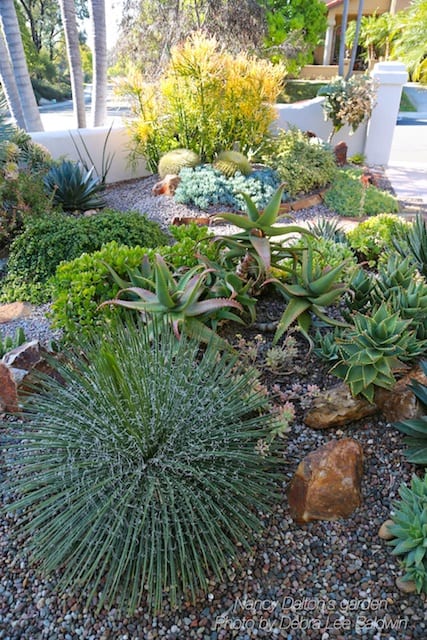
Group plants with varying heights and sizes
In Nancy Dalton's garden, Euphorbia tirucalli 'Sticks on Fire' serves as a backdrop for medium-sized succulents such as barrel cacti and variegated elephant's food (Portulacaria afra 'Variegata'). Low-growing blue Senecio mandraliscae and Othonna capensis complete the high-medium-low vignette.
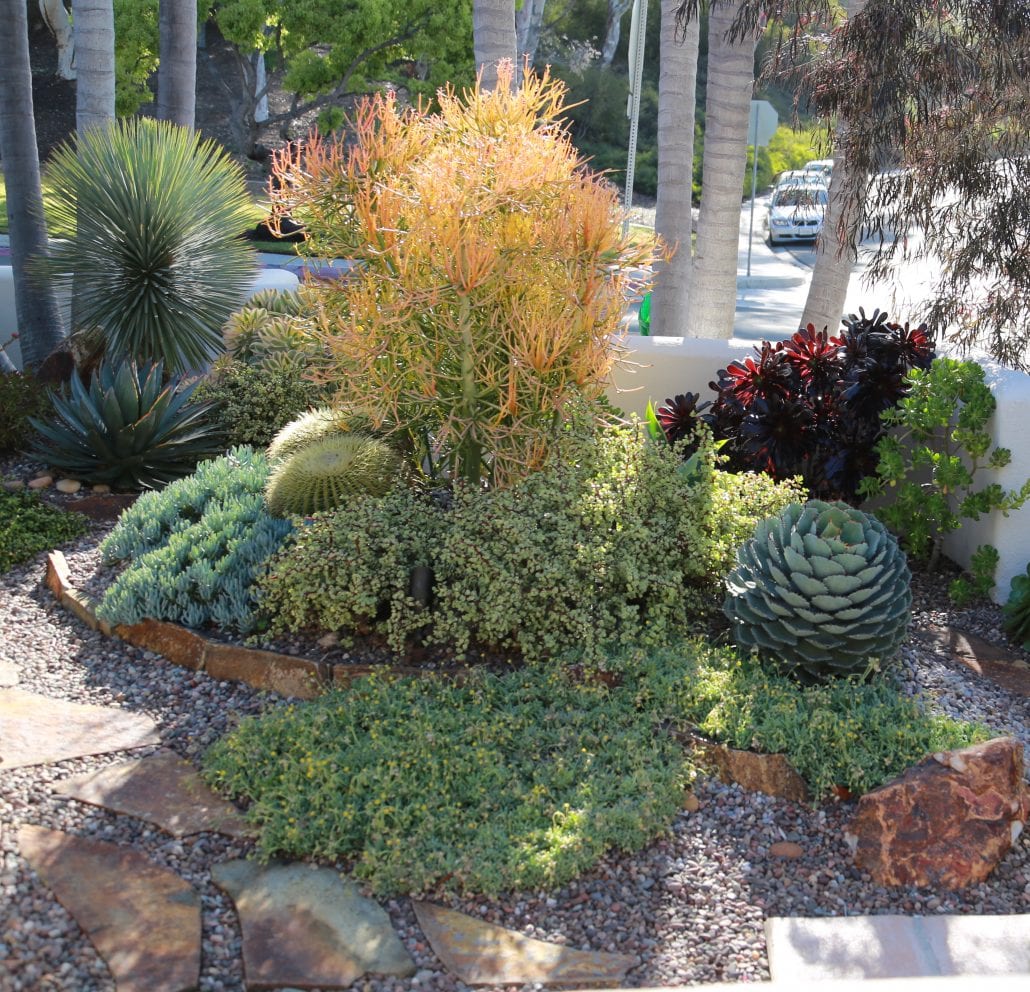
Position plants according to water needs
Those most prone to rot, such as cacti from to the desert Southwest, tend to do best atop a berm that allows water to drain away from their roots. Finer-leaved succulents tend to dry out more easily and will be happiest around the base of the mound or in a swale. See my article, "How to Water Succulents."
Grow rangy non-succulents in pots
Instead of in the ground, Nancy's herb garden occupies large terracotta pots near her kitchen door. This keeps the plants under control (some, like mints, are invasive) and makes them easy to water, tend, harvest, and replant.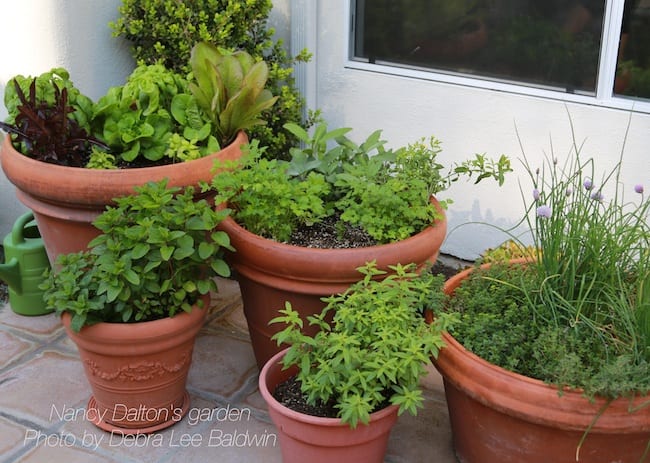
Add a fountain
The sound of splashing water on a patio or adjacent to a garden sitting area blankets neighboring noise and enhances even a small yard's sense of privacy. It also attracts songbirds.
Put complementary colors to work
Succulents come in all colors, as do glazed ceramic pots, so have fun with them! Here, Nancy contrasted blue and orange. Coppertone stonecrop (Sedum nussbaumerianum) in the bed serves as a ground cover, frames the focal point, and flows around pots of Kalanchoe orgyalis (copper spoons) at left and Agave colorata. 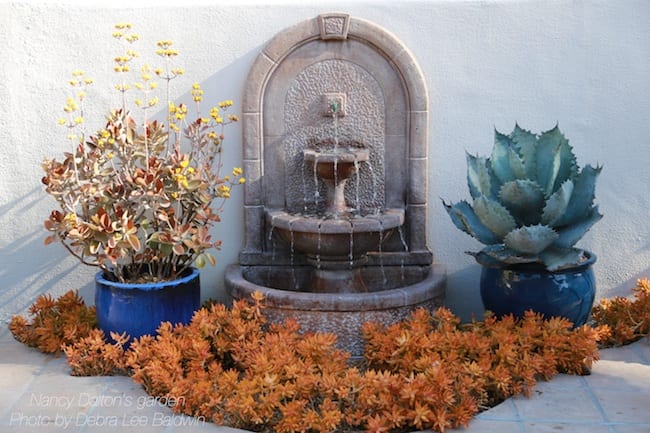
Display dynamic succulents against walls
Nancy lent interest to a white stucco retaining wall with three brightly-glazed pots. They contain a tall, columnar cactus, a clustering euphorbia, and star-shaped Agave lophantha 'Quadricolor'. Find more ideas in my book, Succulent Container Gardens.
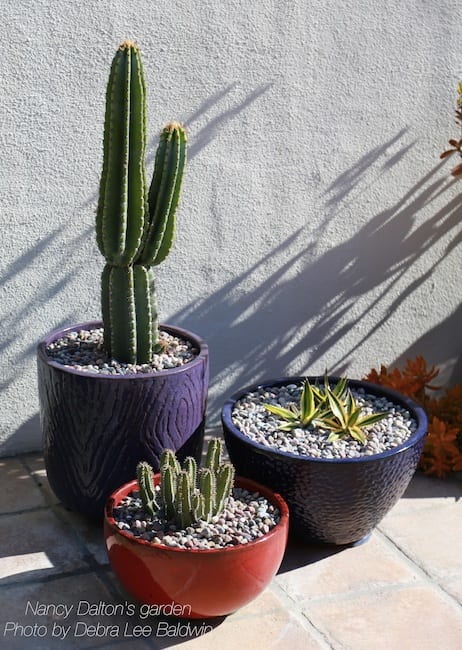
Showcase the symmetry of succulents
Small agaves look great in pots that frame and call attention to their elegant, geometric shapes. Here, Agave victoria-reginae graces a hexagonal pot near Nancy's front door. 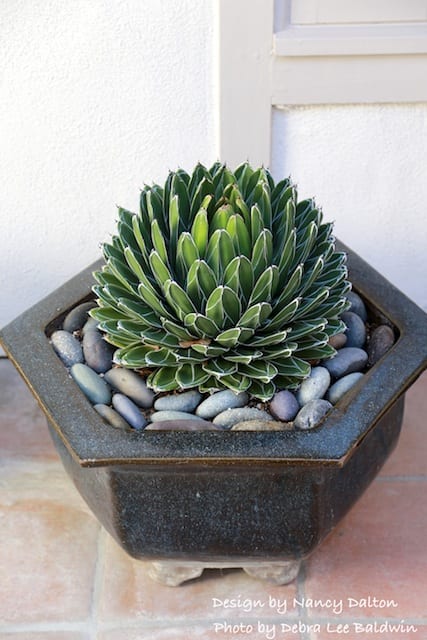
Include a dry creek bed
In a drought-prone climate it's soothing to suggest the presence of water. To create the look of rushing water, designer Michael Buckner lined Nancy's dry creek bed with cobbles turned sideways. Such enhancements can channel water from gutters into the garden and provide access to hard-to-reach areas. See the section in Designing with Succulents on dry creek beds, pp. 56-59.
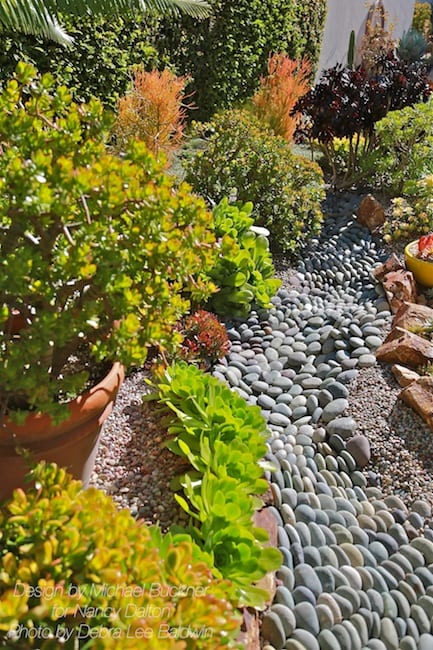
Top-dress bare soil ...
... with crushed rock. It may seem minor, but this often overlooked aspect of design makes a huge difference. A layer of gravel lends a finished look, discourages weed growth, and helps hold moisture in the soil. See my articles, "Ten Reasons Why You Really Need Rocks" and "Why Top Dressing is Essential for Succulents."
Special thanks to Deeter-Buckner design for these "before" photos of Nancy's front yard:
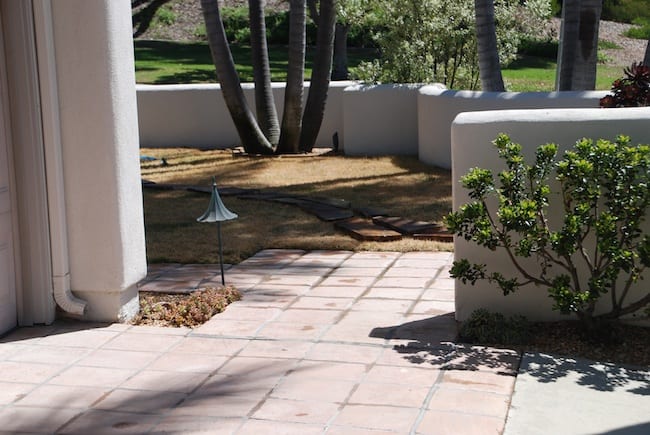
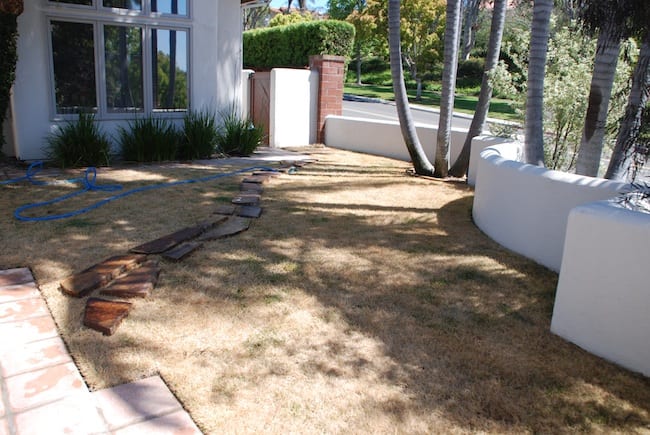
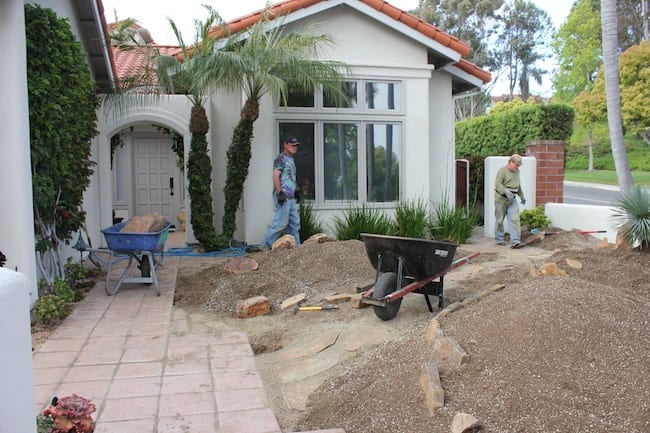
Nancy Dalton's s garden won the city of San Diego's drought-tolerant landscaping contest and was on the San Diego Horticultural Society's Spring Garden Tour. Located in Carmel Valley, the garden has a mild, frost-free climate. Landscape designers Samantha Owens of Barrels and Branches nursery and Michael Buckner of Deeter-Buckner Design helped with soil amendments, plant selection, placement, and installation. Nancy herself is knowledgeable about plants and is a hand's-on gardener.
Resources
Articles
Ten Reasons Why You Really Need Rocks
Why Top Dressing is Essential for Succulents
Download my list of Succulents for Coastal Southern California Gardens.
Videos
See my YouTube channel playlist, "Great Succulent Gardens."
See Nancy's garden in my video, Design Ideas from an Award-Winning Succulent Garden. 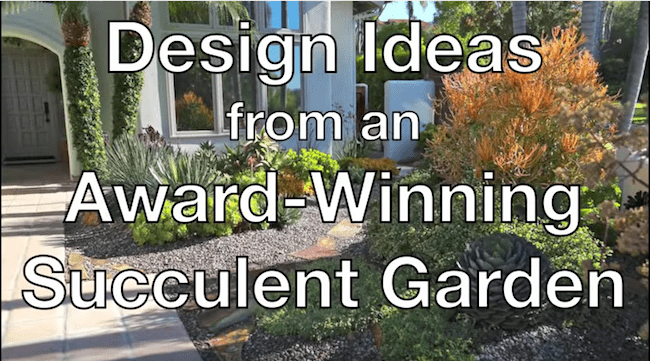
Related info on this site
Why You Really Need Rocks
Smart designers cover bare soil with rocks in succulent gardens that are as sophisticated and good-looking as they are practical.
Patrick Anderson’s Exceptional Succulent Garden
I chose classical music for the video because Patrick, in addition to being a succulent expert, is an opera singer. In my YouTube video, “Patrick Anderson’s Succulent Garden,” I take you on a tour of the residential garden that launched my love of succulents. You’ll see it as it looks now, 25 years after I…
A Colorful Succulent Garden to Copy
You could easily copy this colorful succulent garden at Weidner’s nursery in Encinitas, CA. It’s a three-dimensional showcase of succulents superbly suited to mild, frost-free regions. Most of the plants are readily available, and all are in my book, Designing with Succulents.
Add Art to Your Succulent Garden
Make your succulent garden even more inviting with outdoor art. By using it as an outdoor gallery, you’ll engage in a fun pursuit that expresses your personal style.

